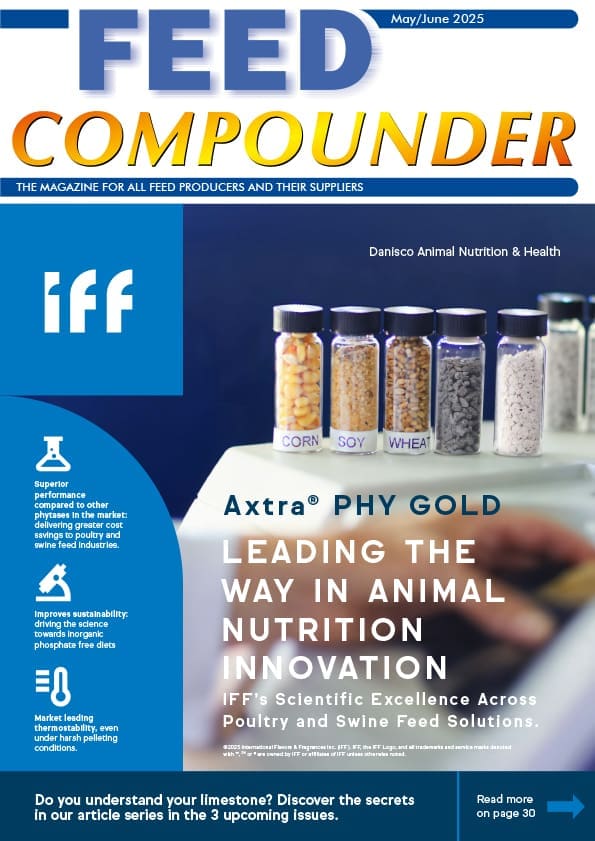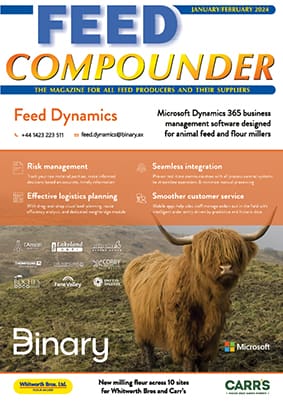More and more pet owners are looking for pet foods that don’t cost the earth, be that financially or environmentally. With this in mind, Dr Maygane Ronsmans, Product Manager Animal Nutrition at BENEO, discusses how more producers are choosing to incorporate plant-based functional ingredients into their formulations, to cater to pet owners’ health and environmental concerns.
Key pet parent trends

Pet parents are very concerned about their pet’s health and results from a BENEO survey reflect this, with more than 4 in 5 owners considering their pet’s health to be as important as their own. One of their main concerns is about weight, which is no surprise as the prevalence of obesity continues to increase in the pet population. In the UK alone, 43% of cats in the country are now classified as overweight, up from 40% in 2014, and half the dog population falls into the same category compared to 45% a decade ago. With this increase reflected in many other countries, more owners are looking to pet food products that can help with weight management.
In addition, protein quality and content are also important for 7 in 10 pet owners. Additionally, sustainability claims are considered to some extent by 4 in 5 owners when choosing food for their pets. With more than half of cat and dog owners considering plant-based proteins to be better for the environment, it is no surprise that vegetal ingredient sources with sustainability credentials are of increasing relevance.
Promoting weight control through blood sugar management
Like in humans, prevention of obesity is always better than cure, and a balanced diet should remain the ‘gold standard’. Nevertheless, when weight loss is required, a multi-pronged approach that combines exercise along with energy-restricted diets is often key. In the context of obesity, the choice of nutrients in pet food can also make a difference and including functional ingredients in a pet’s diet – such as slow-release carbohydrate isomaltulose and prebiotic chicory root fibres – can help with weight and blood glucose management.
For pet food producers looking for low glycaemic carbohydrates, isomaltulose can become a key part of their ingredient toolbox. Isomaltulose is a disaccharide of glucose and fructose derived from sugar beet that is characterised by a stronger glycosidic bond than that of standard sugar. Due to this specific linkage, it is more resistant to enzymatic hydrolysation in the intestine, therefore inducing lower glycaemic and insulin responses than regular sucrose as demonstrated in many species (e.g., humans, rodents and pigs).
A scientific publication from 2023 about three studies from Corbee et al, has confirmed that isomaltulose is a suitable low glycaemic ingredient for use in dog food, triggering a lower blood glucose rise after consumption. In addition, two in-vivo studies compared the effects of isomaltulose, sucrose and maltodextrin in dogs. The results showed that isomaltulose significantly lowered blood glucose and insulin responses, compared to maltodextrin or sucrose – even after continuous feeding. All in all, this property makes isomaltulose a particularly interesting solution with the potential to support metabolic health and weight management in dogs.
BENEO’s portfolio also includes BeneoCarb S, a syrup ingredient that features high levels of the low-glycaemic disaccharides isomaltulose and trehalulose. It is derived from sugar beet as well and can be used in semi-moist and moist products or snacks. This syrup offers producers a natural alternative to traditional ingredients such as glucose syrup or caramel, as well as an opportunity to appeal to health-conscious pet owners.
The power of chicory root fibres
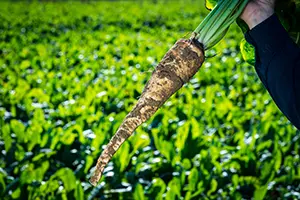
Other functional ingredients that enable blood sugar management in dogs,,,, as well as weight management in pets,, are BENEO’s natural chicory root fibres Orafti® Inulin and Oligofructose. These inulin-type fructans belong to the very few scientifically proven prebiotics, that support a pet’s intestinal health and are linked with nutritional benefits that go beyond the gut.
Since inulin-type fructans are non-digestible carbohydrates and dietary fibres, they do not trigger a rise in postprandial blood glucose or insulin concentrations. As a result, they support blood sugar management in dogs. What’s more, studies in dogs have shown that feeding them with chicory prebiotics can allow for a lower blood sugar response after a meal, and this benefit can extend to a subsequent meal taken hours later, even if that meal doesn’t include chicory root fibres;, which is called the second meal effect.
Plant-based alternatives with sustainability appeal
As demand for more sustainable solutions drives reformulation in the human and pet food spheres alike, vegetal proteins are increasing in popularity as a total or partial animal protein source replacement. This is because plant-based proteins are well received by consumers for their sustainability credentials. For example, more than 80% of pet owners associate faba beans with being sustainable. Natural and high-quality vegetal proteins are therefore becoming a valuable resource for manufacturers, allowing them to cater to pet owners’ environmental interests, whilst formulating nutritious pet food recipes.
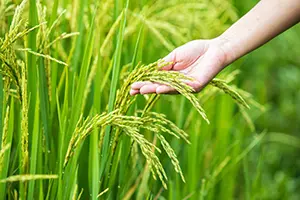
BENEO’s toolbox of vegetal proteins represent concentrated and non-GMO sources of quality protein. They provide excellent amino acid profiles, which can beneficially be blended and enable the development of plant-based or hybrid pet foods. They also offer high to very high digestibility. According to an internal analysis, BENEO’s rice protein and faba bean protein concentrate reach (ileal) digestibility scores close to 90% and vital wheat gluten well above 90%.
Besides its high protein density of approximately 80%, BENEO’s rice protein offers great nutritional benefits. It is hypoallergenic and highly digestible, making it suitable for pets with allergies, as well as sensitive pets such as puppies and older animals. It is also a good source of several essential amino acids (methionine, cysteine, phenylalanine and tyrosine) that are involved in some major metabolic processes and support a pet’s normal and healthy growth. In addition, rice protein is a clean label ingredient which is perceived as natural by almost 9 in 10 pet owners globally.
Similar to the rice ingredient, BENEO’s vital wheat gluten also offers a high protein density of approximately 80%. It delivers an interesting amino acid profile, as it is rich in glutamine, which is the preferred fuel for intestinal cells that can help repair damaged cells, as well as tyrosine, which plays an important role in maintaining fur colour. Vital wheat gluten also has strong viscoelastic properties that can improve the texture of different types of pet food and offer great technological and application benefits. For example, it can positively affect the extrusion behaviour in dry pet food, as well as the chunkiness and meat structure in wet pet food. Thanks to its excellent water absorption capacity, it also increases juiciness in semi-moist or wet pet food and is therefore a valuable alternative to spray-dried plasma.
Reaping the benefits of faba beans
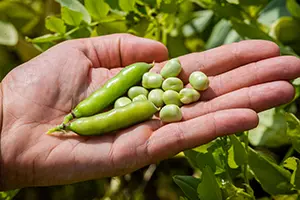
Finally, BENEO’s faba bean protein concentrate, listed in the EU Catalogue of Feed Materials under entry 3.7.5 as “horse bean protein”, is a concentrated source of protein that is suitable for “no grain” claims in pet food and can serve as a good alternative to animal or other plant proteins like soy or pea proteins. Its amino acid profile is relatively rich in lysine and can nicely complement cereals’ protein, meaning faba bean protein can be combined with rice protein or vital wheat gluten. It also contains quite high levels of glutamine, which improves palatability and supports the growth of intestinal cells, as well as arginine, which is considered to be important for cognitive health. BENEO’s range of faba bean ingredients for pet food also includes starch-rich flour and hulls, offering a good source of starch and dietary fibre.
When it comes to sustainability, faba beans help to reduce greenhouse gas emissions at farm level. The faba beans can capture nitrogen from the air, to provide it for themselves and subsequent plants, which reduces the need for fertilizer input. Also, the faba beans are grown in a region with good rainfall and soil with good water retention capacity, so that irrigation is not necessary. BENEO strives to source its faba beans at Farm Sustainability Assessment (FSA) Gold level from German farmers with long-term contracts, to ensure production and supply stability. Furthermore, the production process, being done locally in Germany, has been chosen for its low energy consumption in comparison to alternative processes and requires no water resources overall contributing to BENEO’s sustainability targets.
As can be seen, nutritional and sustainability benefits can be addressed using functional ingredients. Thanks to such ingredients, and the supporting science around them, it is now possible for producers to meet pet owner demands for healthier, more sustainable foods in creative and exciting ways.
BENEO source references for this article are available on request.


